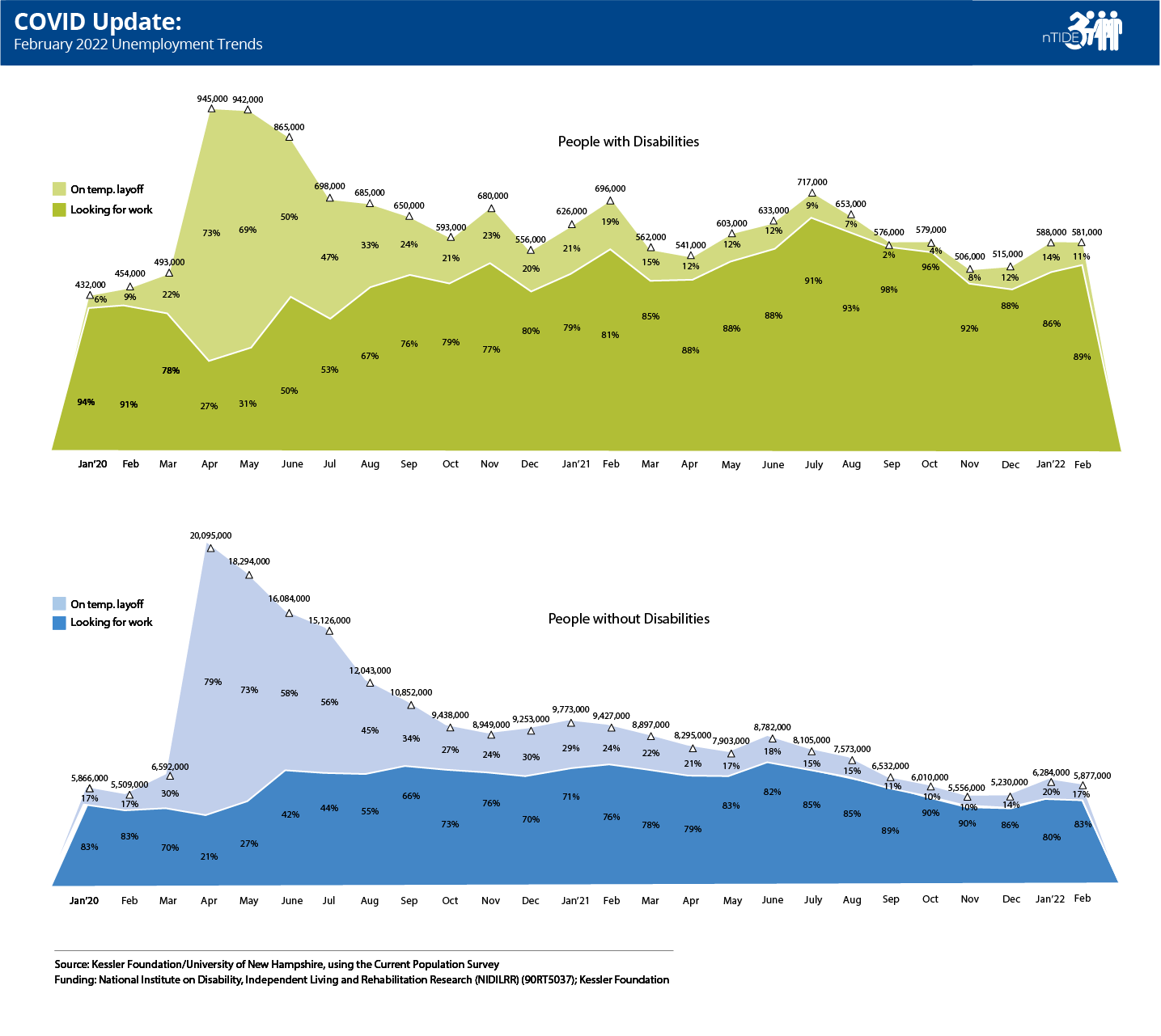National Trends in Disability Employment (nTIDE) – issued semi-monthly by Kessler Foundation and the University of New Hampshire
East Hanover, NJ. March 18, 2022. There was little change in unemployment in February as the economy weathered the waning effects of the omicron surge, according to today’s National Trends in Disability Employment (nTIDE) COVID Update.
The slowing of forward momentum in January persisted into February, as shown in the mountain graphic. The minimal declines in February’s unemployment numbers for people with and without disabilities fall within the margin of error, according to nTIDE expert Andrew Houtenville, PhD, professor of economics at the University of Hampshire (UNH) and research director of the UNH Institute on Disability. “With the decline in COVID-19 cases and the lifting of pandemic restrictions across the nation, we may see improvement in the March numbers,” said Dr. Houtenville.
Referencing the recent nTIDE Special Edition, Dr. Houtenville reiterated the good news underlying the pace of the decline in unemployment.
“There’s a big difference in labor force participation between people with and without disabilities. The labor force participation rate is up for people with disabilities, but not for people without disabilities. Clearly, people with disabilities are engaging more in the labor market by working and looking for work.”

pre-pandemic and current unemployment data from January 2020 to February 2022. February numbers show
little change in unemployment for both groups, which may reflect a persistent impact of the omicron surge during
February.
Dr. Houtenville advised a nuanced approach to evaluating unemployment rates. “It’s important to remember that the unemployment numbers include people who are looking for work,” he emphasized. “More people with disabilities are working, and as shown in the graphic, more are actively looking for work compared to pre-pandemic levels. The graphic also shows that the number of people without disabilities who are looking for work has yet to exceed pre-pandemic levels.
Field Notes
Other factors may be affecting the sluggish improvement in unemployment, according to Elaine E. Katz, MS, CCC-SLP, senior vice president of grantmaking and communications at Kessler Foundation, who cited information from NJ APSE (New Jersey Association of People Supporting Employment), where she serves as a board member. “While referrals are picking up for jobseekers with disabilities, placement is slow due to the ongoing shortage of job coaches and support staff,” reported Katz. “Many employment service providers lost staff during the pandemic lockdown and are having difficulty finding qualified candidates for relatively low paying positions."
Pre-existing staff shortages may have been exacerbated by the pandemic lockdown, according to nTIDE co-author John O’Neill, PhD, director of the Center for Employment and Disability Employment research at Kessler Foundation. Dr. O’Neill spoke with Julie Christensen, MSW, PhD, executive director of National APSE, to confirm the findings of APSE’s survey conducted before the COVID-19 pandemic, which revealed chronic understaffing of service providers by 30 percent. Dr. O’Neill is on the board of Job Path NYC, which shares the staffing issues of other employment service providers. “Job Path reports a positive trend in their recent hiring efforts,” said Dr. O’Neill, “as younger people with a commitment to social justice show interest in working with jobseekers with disabilities.”
Upcoming nTIDE webinars scheduled for April 1 and April 22.
Each nTIDE release is followed by a Lunch & Learn webinar at 12:00 ET, featuring nTIDE experts Andrew Houtenville, PhD and John O’Neill, PhD. You may register for upcoming webinars, and view the nTIDE archives here: nTIDE Lunch & Learn Webinar Series | Center for Research on Disability
About nTIDE Updates
National Trends in Disability Employment (nTIDE), is a joint project of Kessler Foundation and the University of New Hampshire Institute on Disability, co-authored by Dr. Houtenville and John O'Neill, PhD, of Kessler Foundation. The nTIDE team closely monitors the job numbers, issuing semi-monthly nTIDE reports, as the labor market continues to reflect the many challenges of the pandemic. Since 2013, a monthly nTIDE has been issued in conjunction with the first Friday Jobs Report issued by the Bureau of Labor Statistics. In April of 2020, restrictions on economic activity in the U.S. due to the COVID-19 pandemic precipitated an unprecedented rise in furloughs and people looking for work, prompting the addition of this mid-month nTIDE COVID Update. The mid-month nTIDE follows two key unemployment indicators – furloughs, or temporary layoffs, and the number of people looking for work, comparing trends for people with and without disabilities.
Funding: Kessler Foundation and the National Institute on Disability, Independent Living and Rehabilitation Research (NIDILRR) (90RT5037)
About Kessler Foundation
Kessler Foundation, a major nonprofit organization in the field of disability, is a global leader in rehabilitation research that seeks to improve cognition, mobility, and long-term outcomes -- including employment -- for people with neurological disabilities caused by diseases and injuries of the brain and spinal cord. Kessler Foundation leads the nation in funding innovative programs that expand opportunities for employment for people with disabilities.
About the Institute on Disability at the University of New Hampshire
The Institute on Disability (IOD) at the University of New Hampshire (UNH) was established in 1987 to provide a coherent university-based focus for the improvement of knowledge, policies, and practices related to the lives of persons with disabilities and their families. For information on the NIDILRR-funded Employment Policy and Measurement Rehabilitation Research and Training Center, visit ResearchonDisability.org.
Interested in trends on disability employment? Contact Carolann Murphy to arrange an interview with our experts: 973.324.8382
[email protected]
Twitter | Facebook | YouTube | Instagram | iTunes & SoundCloud